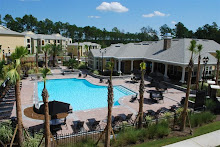Hurricane Preparation Checklist
What should I do?
Make sure you have Renter’s Insurance!!! Be sure you have your policy numbers and claims dept. phone
number handy. Remember…the apartment community’s insurance covers our buildings…not your belongings.
Listen to a NOAAWeather Radio for critical information from the National Weather Service (NWS).
Check your disaster supplies and restock as needed.
Bring in anything that can be picked up by the wind (lawn furniture on balconies, etc.)
Close windows and doors.
Turn the refrigerator and freezer to the coldest setting and keep them closed as much as possible so that food will last longer if the power goes out.
Unplug small appliances.
Fill your car’s gas tank
Talk with members of your household and create an evacuation plan.
Learn about your community’s hurricane response plan. Plan routes to local shelters, register family members with special medical needs as required and make plans for your pets to be cared for.
Evacuate if advised by authorities. Be careful to avoid flooded roads and washed out bridges.
What supplies do I need?
Water—3+ day supply; one gallon per person per day.
Food—3+ day supply of non-perishable, easy-to-prepare food.
Flashlight.
Extra batteries.
First aid kit.
Multi-purpose tool.
Sanitation and personal hygiene items.
Cell phone with chargers.
Family and emergency contract information.
Extra cash.
Emergency blanket.
Map(s) of the area.
Baby supplies (bottles, formula, diapers).
Pet supplies (collar, leash, ID, food, carrier).
Tools/supplies for securing your home.
Extra set of car keys and house keys.
Extra clothing, hat and sturdy shoes.
Rain gear.
Insect repellent and sunscreen.
Camera for photos of damage.
Battery-powered or hand-crank radio (NOAAWeather Radio, if possible).
Medications (7-day supply) and medical items (hearing aids w/extra batteries, glasses, contact lenses, syringes, cane).
Copies of personal documents (medication list and pertinent medical information, proof of address, lease to residence, passports, birth certificates, insurance policies).
What do I do after a hurricane?
Stay alert for extended rainfall and subsequent flooding even after the hurricane or tropical storm has ended.
If you evacuated, return home only when officials say it is safe.
Drive only if necessary and avoid flooded roads and washed-out bridges.
Keep away from loose or dangling power lines and report them immediately to the power company.
Stay out of any building that has water around it.
Inspect your home for damage. Take pictures of damage, both of the building and its contents, for insurance purposes.
Use flashlights in the dark. Do NOT use candles.
Avoid drinking or preparing food with tap water until you are sure it’s not contaminated.
Emergency Numbers:
FEMA : 800-621-3362
Red Cross: 866-438-4636
What should I do?
Make sure you have Renter’s Insurance!!! Be sure you have your policy numbers and claims dept. phone
number handy. Remember…the apartment community’s insurance covers our buildings…not your belongings.
Listen to a NOAAWeather Radio for critical information from the National Weather Service (NWS).
Check your disaster supplies and restock as needed.
Bring in anything that can be picked up by the wind (lawn furniture on balconies, etc.)
Close windows and doors.
Turn the refrigerator and freezer to the coldest setting and keep them closed as much as possible so that food will last longer if the power goes out.
Unplug small appliances.
Fill your car’s gas tank
Talk with members of your household and create an evacuation plan.
Learn about your community’s hurricane response plan. Plan routes to local shelters, register family members with special medical needs as required and make plans for your pets to be cared for.
Evacuate if advised by authorities. Be careful to avoid flooded roads and washed out bridges.
What supplies do I need?
Water—3+ day supply; one gallon per person per day.
Food—3+ day supply of non-perishable, easy-to-prepare food.
Flashlight.
Extra batteries.
First aid kit.
Multi-purpose tool.
Sanitation and personal hygiene items.
Cell phone with chargers.
Family and emergency contract information.
Extra cash.
Emergency blanket.
Map(s) of the area.
Baby supplies (bottles, formula, diapers).
Pet supplies (collar, leash, ID, food, carrier).
Tools/supplies for securing your home.
Extra set of car keys and house keys.
Extra clothing, hat and sturdy shoes.
Rain gear.
Insect repellent and sunscreen.
Camera for photos of damage.
Battery-powered or hand-crank radio (NOAAWeather Radio, if possible).
Medications (7-day supply) and medical items (hearing aids w/extra batteries, glasses, contact lenses, syringes, cane).
Copies of personal documents (medication list and pertinent medical information, proof of address, lease to residence, passports, birth certificates, insurance policies).
What do I do after a hurricane?
Stay alert for extended rainfall and subsequent flooding even after the hurricane or tropical storm has ended.
If you evacuated, return home only when officials say it is safe.
Drive only if necessary and avoid flooded roads and washed-out bridges.
Keep away from loose or dangling power lines and report them immediately to the power company.
Stay out of any building that has water around it.
Inspect your home for damage. Take pictures of damage, both of the building and its contents, for insurance purposes.
Use flashlights in the dark. Do NOT use candles.
Avoid drinking or preparing food with tap water until you are sure it’s not contaminated.
Emergency Numbers:
FEMA : 800-621-3362
Red Cross: 866-438-4636













No comments:
Post a Comment
Note: Only a member of this blog may post a comment.